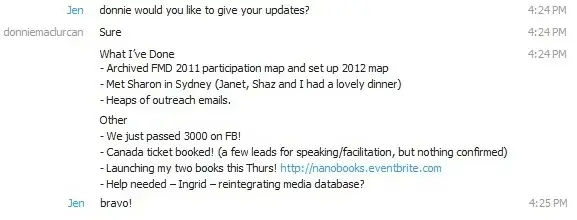PostGrowth: Founding an organization remotely via Skype chat

Christian Kreutz: I'm here at the Peer Value Conference with Donnie Maclurcan? I pronounced it right. That's very nice. I was very intrigued about the work you're saying you're doing. Tell me a bit about what you're doing? Donnie Maclurcan: Six years ago, with 10 individuals, we co-founded a global economics institute called the Post Growth Institute. We look at what comes after capitalism. What was fascinating to me -- and relates a lot to the processes that we've engaged with since then -- is some of the lessons we learned about starting our organization, and what really motivates people to continue being part of the organization, and builds trust within our group.
Two things here emerged, and they relate largely to the very first experience we had. Imagine 10 people around the world from six different countries, who are all being connected via email and the Twitter hashtag #postgrowth.
Christian: How did you get to know each other?
Donnie: Yeah. Via setting up a hashtag #postgrowth.
Christian: Did one person set up the hashtag?
Donnie: Yes. Other people we connected via blogs. But it was all electronic connections. No one had met with each other. We had our first meeting planned on Skype, a video meeting. Of course within the first few seconds, the video crashed. All of a sudden we go over to typed format -- the instant messaging form.
For the last six years we never deviated from that. All of our meetings other than every second month where we have a personal check-in, which is visual. Every other meeting that we hold is all just typed.
Christian: Is it chat? You had to chat, wasn't it?
Donnie: We had to chat. What's amazing about chat -- the reasons which we learned later on -- is that it's extremely participatory, extremely efficient, and extremely supportive of all the people in the team. The way that happens is as follows, in Skype for example when you write a message and you're watching someone else write a message, you'll see the little pencil moving.
Let's say I'm chairing a meeting with a bunch of people here. I have an agenda item which is to discuss the time that we suggest or what we feel about raising money through certain means? Then we have a discussion about that. As the moderator of that discussion I don't move on until I see that pencil stop moving, disappear for example.
Christian: You had to moderate it. That's probably for the presentation part?
Donnie: Yeah. There's always a chair but that's an interesting point we can get to in a moment. The crucial thing here is that, in a voice meeting, let's say, typically someone will say, "All right. Any other views on that?" If someone doesn't speak up in the next one second, or two seconds, it's over.
But in Skype, you wait until the pencil stops moving and even if you start to move on, if the pencil starts moving again, on the screen, you know that someone wants to say something. In other words the conversation isn't over, until it's really over. Here is the most crucial thing we learned about this.
The research shows that 25 percent of groups or more are introverted in attendances. As an extroverted group meetings, I know how much people like myself control meetings. We take over. We do that by having a lot of talk, and not much silence in the meetings.
When you have Skype meetings or online instant message meetings, all of a sudden your meetings are in silence. It gives people who have visual and written communication forms, who favor those forms of communication it gives them a chance to actually participate in ways that they can't easily participate in spoken meetings.
Christian: Or they wouldn't have to do it?
Donnie: Right. Our team is probably I would say 50/50 or maybe even slightly introverted in its nature and yet those people are some of the most vocal in our team, because it gives them a chance to see text and respond by writing. Before they click, send on a message, they can see what they've written, which you can't do when you speak.
You can't plan always what you want to say and then say it and revise it. You can even edit messages in instant messenger, if you want to change it. You also have the added bonus of...Communications in western world we're not very good at. We get hurt by lots of things that people say at meetings. We take them the wrong way, etc.
In instant messenger, it's not that online communication isn't froth with difficulty in terms of the things we say -- it is. We mistake an email for meaning something where it doesn't.
The emoticons that you can add at the end of messages can totally relax people, because you can say a line that might look like it could be interpreted in certain ways and be mostly provocative and then you put a smiley face or a wink and it would take the edge of that message, if there is already a base level of trust within the group.
Christian: I want you to discuss that.